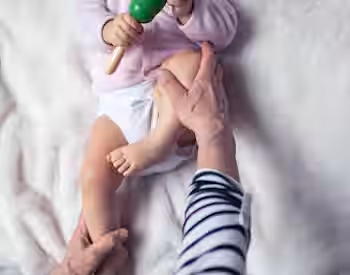Clear signs of hip dysplasia ignored by health visitor

The girl's mother took her to a routine appointment with a health visitor when she was eight-months old when uneven thigh creases were noted but not acted upon. Her legs were wrongly recorded as 'equal length'.
The mother had previously been concerned that her daughter needed support to walk. If she had been correctly advised by the health visitor, the baby would have been referred to her GP at which point less intrusive and more successful treatment would have likely been offered.
Asymmetric thigh creases and unequal leg length can indicate hip dislocation and it is mandatory to examine children accurately for the condition and to refer them for medical assessment by their GP. The child's case was that her left hip was very likely dislocated at her eight-month check-up.
Routine treatment for hip dysplasia in young babies includes closed reduction surgery under general anaesthetic and three-months wearing a corrective cast. General outcome of such surgery is that children go on to live pain free and with a fully functioning hip.
The girl's mother became increasingly concerned that her daughter was limping when she walked at around 14 months old and took her back to the clinic, at which point they were referred to their GP. The girl was then diagnosed with right-sided hip dysplasia and underwent left open reduction and femoral osteotomy fixed with plate and screws. The prognosis for hip surgery for a child who has begun to walk is less favourable than for a younger baby not yet walking.
Because of the delay in diagnosing and treating the child, she will likely face further childhood surgeries and has a higher risk of developing problems when she is older. She will be limited in her activities and will need help with housework, DIY, gardening and similar activities.
The defendant – the NHS Commissioning Board responsible for health clinics – admitted breach of duty in their care of the baby and agreed settlement, which included:
Compensation for the parents for the past care/extra travel/aids and equipment provided by the parents and
- All future medical care on a private basis
- Future care and domestic assistance
- Various therapies
- Loss of earnings
- Aids and equipment (including home adaptations)
- Help with childcare when Sophia has children of her own.
The funds have been paid into a Personal Injury Trust for the girl to be used as needed.
Contact us
For further information about hip dysplasia claims, please call Will Jones on 03304606822 or email will.jones@fieldfisher.com.
Alternatively
- You can speak to our medical negligence solicitors on freephone 0800 358 3848
- email us: personalinjury@fieldfisher.com
- Complete the short online enquiry form
All enquiries are completely free of charge and we will investigate all funding options for you including no win no fee. Find out more about no win no fee claims.

